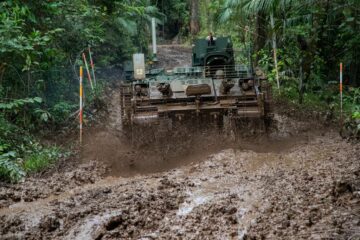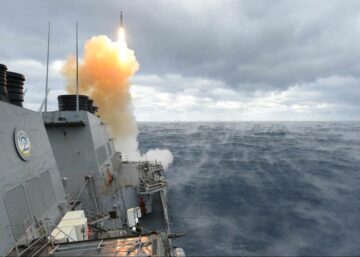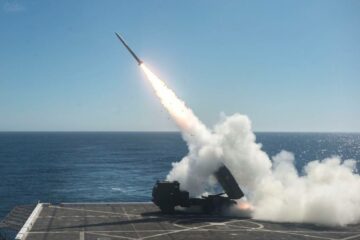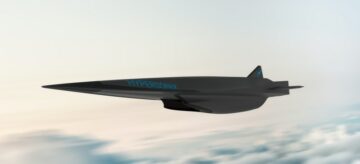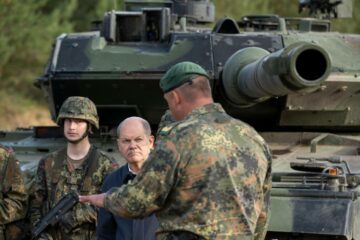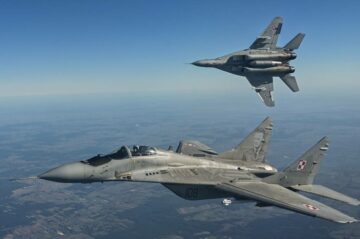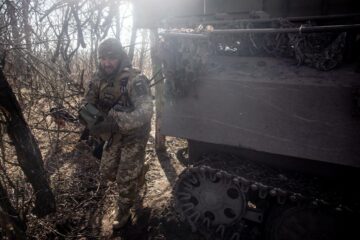
PARIS — Recruitment difficulties are bedeviling militaries across Europe as they seek to build up their strengths in the face of Russian aggression, an assertive China and a deteriorating security situation in parts of Africa and the Middle East.
With European countries spending billions of euros to buy additional weapons in response to Russia’s invasion of Ukraine, the question becomes whether their armed forces can hire enough people to use them. Tight labor markets and a Generation Z reluctant to enlist are weighing on military recruitment in developed economies, despite increased defense budgets.
In the United Kingdom, four Royal Navy warships could be in line for the axe in part due to insufficient personnel to crew new vessels approaching completion. Meanwhile, the Dutch air force is easing admission requirements for skills training of its soldiers to address a shortage of specialists. And in Germany, military recruitment fell 7% in the first four months of 2023, Der Spiegel reported in August.
On Europe’s eastern flank, Poland has the ambition to build up one of the largest militaries on the continent, and the country has been ordering hundreds of tanks, artillery pieces, aircraft and navy vessels. Poland faces similar recruitment challenges as other nations, Ed Arnold, a research fellow for European security at the Royal United Services Institute in London, told Defense News.
“One of the major issues in Poland, which is also evident in other countries, is retention and recruitment of personnel, both in terms of quality and quantity,” Arnold said. “Poland has the ambition to field five heavy divisions and one of the key constraints actually might be that they don’t have enough people to go in the tanks when they arrive.”
Andrew Murrison, British Ministry of Defense’s under secretary for personnel policies, told lawmakers in London the problem is creeping up on many allied nations.
“It is right to point out that right across the western world there is a crisis in retention and recruitment into the armed forces,” he said Jan. 8.
A Royal Navy spokesperson acknowledged recruitment was a significant concern but declined to provide data showing the scale of the problem.
Defence Secretary Grant Shapps and defense-procurement minister James Cartlidge were both quizzed over media reports that some warships could be phase out early because of personnel and money shortages.
The Times, who reported the possible mothballing of HMS Albion and HMS Bulwark, and the Daily Telegraph, who reported the potential laying up of two Type 23 frigates, HMS Westminster and HMS Argyll, both quoted unnamed sources saying the moves were in response to a recruitment crisis which required the Navy to switch sailors from the current fleet to crew new Type 26 frigates being built for the service.
No final decision has been made by the government on the fate of the Albion-class warships, Cartlidge told lawmakers. No mention was made of the status of the Type 23 decision.
Decommissioning ships ahead of new ones entering service risks squeezing Britain’s surface combatant fleet amid increasing maritime tension in regions like the Red Sea.
Meanwhile, the Netherlands Royal Air Force has been having a hard time filling specialist jobs, leading officials to relax education prerequisites in hopes of boosting hiring, defense ministry spokesperson Wendy Ryan told Defense News.
“We have significant shortages in a number of fields,” Ryan said. “By relaxing the pre-education requirements and then bringing people up to the right level ourselves, we think we can greatly improve our fill rates. We are going to increase the pool of potential new recruits.”
If the training program is successful, the air force may expand the relaxed admission policy to other job areas including ground-equipment mechanics and munitions engineering, Ryan said.
Chuter reported from London.
Rudy Ruitenberg is a Europe correspondent for Defense News. He started his career at Bloomberg News and has experience reporting on technology, commodity markets and politics.
Andrew Chuter is the United Kingdom correspondent for Defense News.
- SEO Powered Content & PR Distribution. Get Amplified Today.
- PlatoData.Network Vertical Generative Ai. Empower Yourself. Access Here.
- PlatoAiStream. Web3 Intelligence. Knowledge Amplified. Access Here.
- PlatoESG. Carbon, CleanTech, Energy, Environment, Solar, Waste Management. Access Here.
- PlatoHealth. Biotech and Clinical Trials Intelligence. Access Here.
- Source: https://www.defensenews.com/global/europe/2024/01/10/hiring-woes-bedevil-european-nations-stocking-up-on-weapons/
- :has
- :is
- $UP
- 2023
- 23
- 26
- 70
- 8
- 9
- a
- acknowledged
- across
- actually
- Additional
- address
- africa
- ahead
- AIR
- Air Force
- aircraft
- also
- ambition
- Amid
- an
- and
- approaching
- ARE
- areas
- armed
- AS
- At
- AUGUST
- BE
- because
- becomes
- bedeviling
- been
- being
- billions
- Bloomberg
- boosting
- both
- Bringing
- British
- Budgets
- build
- built
- but
- buy
- by
- CAN
- Career
- challenges
- China
- commodity
- completion
- Concern
- constraints
- continent
- could
- countries
- country
- crew
- crisis
- Current
- daily
- data
- decision
- Defense
- Despite
- developed
- difficulties
- Dont
- due
- Dutch
- Early
- easing
- East
- eastern
- economies
- ed
- Education
- Engineering
- enough
- entering
- Europe
- European
- European Countries
- Europes
- Euros
- evident
- Expand
- experience
- Face
- faces
- fate
- fellow
- field
- Fields
- fill
- filling
- final
- First
- five
- FLEET
- For
- Force
- Forces
- four
- from
- generation
- generation Z
- Germany
- Go
- going
- Government
- grant
- greatly
- Hard
- Have
- having
- he
- heavy
- hire
- Hiring
- his
- hopes
- HTTPS
- images
- improve
- in
- In other
- Including
- Increase
- increased
- increasing
- Institute
- into
- invasion
- issues
- ITS
- james
- Jan
- Job
- Jobs
- jpg
- Key
- Kingdom
- labor
- largest
- lawmakers
- laying
- leading
- Level
- like
- Line
- London
- made
- major
- major issues
- many
- Maritime
- Markets
- May..
- Meanwhile
- mechanics
- Media
- mention
- Middle
- Middle East
- might
- militaries
- Military
- minister
- ministry
- money
- months
- moves
- Nations
- Netherlands
- New
- news
- no
- number
- of
- officials
- on
- ONE
- ones
- Other
- our
- ourselves
- out
- over
- part
- parts
- People
- Personnel
- phase
- pieces
- plato
- Plato Data Intelligence
- PlatoData
- Point
- Poland
- policies
- policy
- politics
- pool
- possible
- potential
- prerequisites
- Problem
- Program
- provide
- quality
- quantity
- question
- Rates
- recruitment
- Recruits
- Red
- Relax
- relaxed
- Reported
- Reporting
- Reports
- required
- Requirements
- research
- response
- retention
- right
- risks
- royal
- russian
- Ryan
- Said
- saying
- Scale
- secretary
- security
- Seek
- service
- Services
- ships
- shortage
- shortages
- showing
- significant
- similar
- situation
- skills
- some
- Sources
- specialist
- specialists
- Spending
- spokesperson
- started
- Status
- strengths
- successful
- Surface
- Switch
- Tanks
- Technology
- terms
- that
- The
- the Netherlands
- the United Kingdom
- their
- Them
- then
- There.
- they
- Think
- time
- times
- to
- told
- Training
- two
- type
- Ukraine
- under
- United
- United Kingdom
- UNNAMED
- use
- vessels
- was
- we
- Weapons
- weighing
- were
- Western
- Western World
- when
- whether
- which
- WHO
- world
- zephyrnet

